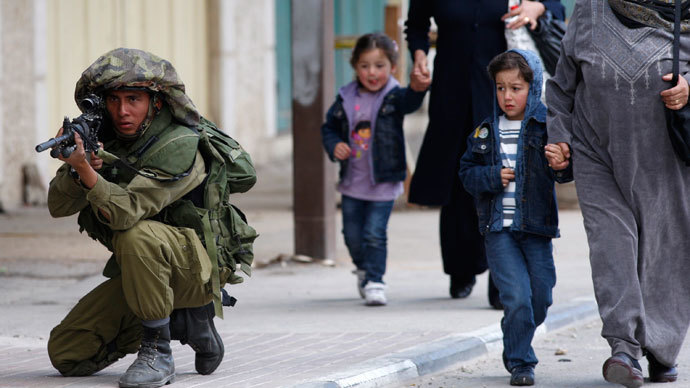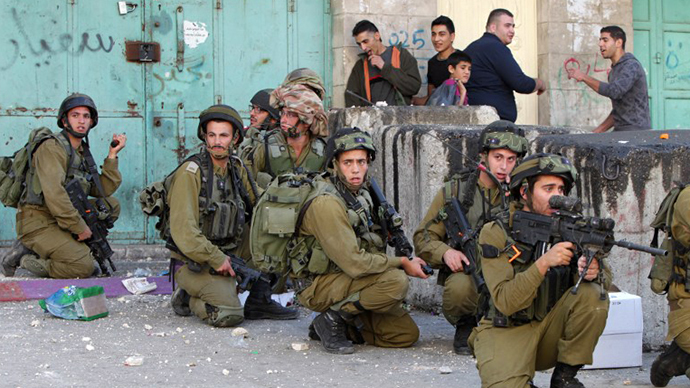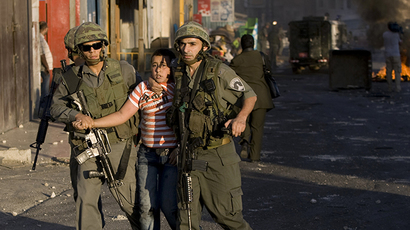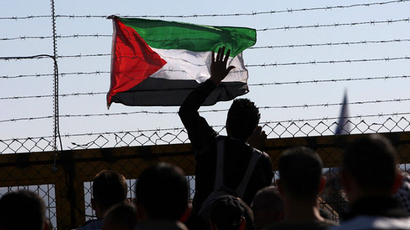Duck and cover: Israeli army drills in populated Palestinian areas are ‘legal’ – IDF

IDF training exercises in villages and even in Palestinian civilians’ houses are “a breach of the basic principles of international and humanitarian laws,” an Israeli NGO claims. The IDF’s lawyers claim that the drills are perfectly legal, however.
Investigative reports by Israeli NGO Yesh Din have described
scenes of military operations on civilian homes or in close
proximity to a Palestinian cemetery that sound like they could be
part of a Hollywood action movie. But the exercises are real, and
are carried out by the Israel Defense Forces (IDF) on a regular
basis.
Last Thursday, Yesh Din released a video shot by its volunteers,
showing Israel Defense Forces troops training in close proximity
to a Palestinian cemetery.
“We were shocked to discover last week that training was
taking place in a cemetery in Hebron, in blunt disregard of the
sensitivities of local civilians,” Yesh Din attorney Emily
Schaeffer said, Haaretz reported. “I find it hard to believe
that the IDF would hold training of this type in a Jewish
cemetery, or in any Jewish neighborhood in the West Bank or
within Israel.”
Another story reported by Yesh Din shows Israeli troops storming
the backyard of a Palestinian family home at Tel Rumeida in
Hebron during the Muslim holy month of Ramadan. Some 15 soldiers
break in while the Palestinian family is having their breakfast,
scatter inside the house, and practice taking the building by
assault using special equipment. This allegedly all took place
while the family were inside the house.

These may seem like the kinds of reports that the IDF would never
possibly acknowledge or comment on. But after the Israeli NGO
stepped in and launched a complaint claiming there had been a
“series” of such training exercises in Palestinian
villages, the Israeli army’s judicial body decided to
investigate.
On Monday, an IDF spokesman said that, after looking into the
matter, the IDF’s Military Advocate General (MAG) “found that
there was no legal obstacle to holding training in inhabited
areas as part of maintaining security in the area.”
The legality of training inside the villages in the Palestinian
Territory is anchored in the principles of “belligerent
occupation,” wrote MAG’s deputy prosecutor for operational
affairs, Maj. Harel Weinberg. Such principles hold that an
Israeli military commander is the sovereign authority in the
area, and must maintain security and public order in the West
Bank – including by means of occasional training exercises in
populated areas.
The MAG, however, promised to “make clear” that the
soldiers taking part in drills “must avoid putting the
population at risk, damaging their property or causing
unreasonable disturbance to their daily routine.” Any
deviations from these rules will have to be clarified with the
MAG, which will “take the appropriate measures” when
necessary.

Under international humanitarian law, the population in the
Palestinian Territory are regarded as protected persons. The
Fourth Geneva Convention defines protected persons as “those
who, at a given moment and in any manner whatsoever, find
themselves, in case of a conflict or occupation, in the hands of
a Party to the conflict or Occupying Power of which they are not
nationals.”
But while Israel is bound by international law to protect
Palestinians in the area, it also maintains the sovereign
authority of its military in most of the occupied territories
(the so-called Area C). Palestinian activists claim the concept
has been used by Israeli soldiers to act with “virtual
impunity” when it comes to the Palestinian population.
The occupied Palestinian territories comprise the West Bank,
including East Jerusalem, and the Gaza Strip. They have often
been referred to as such by the UN and international legal bodies
ever since Israel overtook both from Jordan and Egypt in 1967,
following the Six-Day War. Prior to that, they made up part of
the larger area intended by the United Nations to become the
territory of the future State of Palestine. Following the 1993
Oslo Accords, parts of the territories – known as Areas A and B –
came under the jurisdiction of the Palestinian National
Authority, while Israel retained full military control over most
of the area – Area C – now comprising 61 percent of the West
Bank. Following the 2007 Hamas takeover in Gaza, the OPT became
politically divided, with the Gaza Strip being governed by Hamas
and West Bank areas dominated by Fatah.














